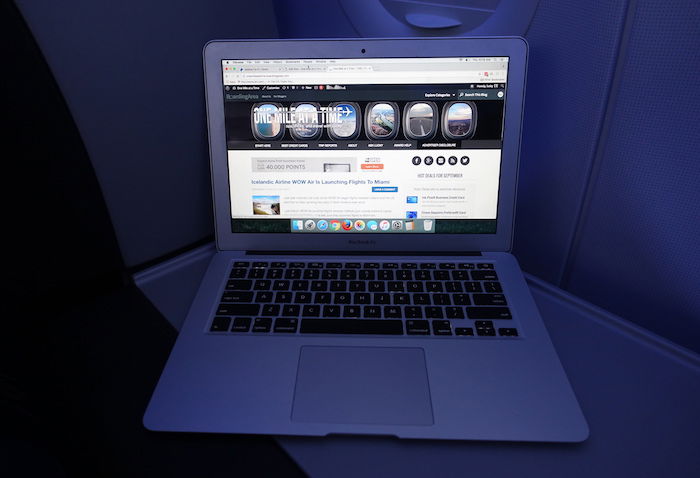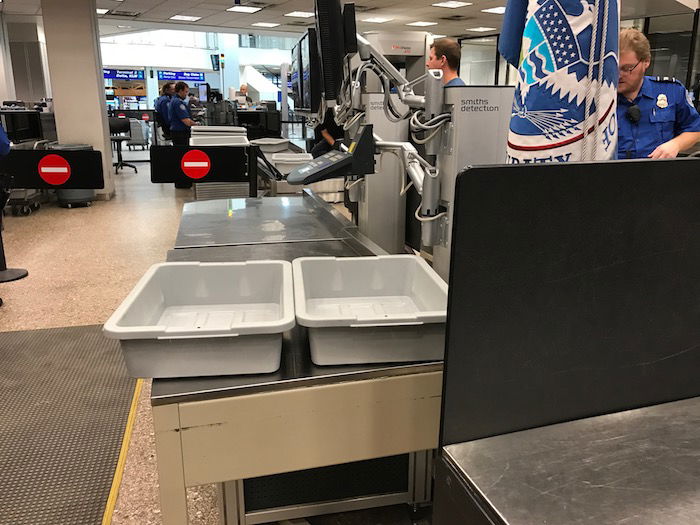The past several months have been a bit of a roller coaster in terms of whether or not an electronics ban will be implemented on more flights. The US first implemented an electronics ban on flights from select airports in the Middle East to the US in late March, and since then they’ve gone back and forth about whether or not this electronics ban should be expanded to flights from Europe to the US.
It very much seems like the US wanted to implement this, but European security officials talked them out of it, noting the added risk of more electronics being in the cargo hold, and the risk of fire that comes with that.
The US is introducing new security requirements
The United States Department of Homeland Security has announced that they’ll implement heightened security measures for the roughly 2,100 daily international flights to the US, but they’ll stop just short of an electronics ban, which is good news.
These new security measures are to be implemented in 105 countries around the world, which are the last point of departure prior to nonstop flights to the US.
Not surprisingly, they’re not being all that clear about what these new measures entail, though they say that the new measures could include the following:
- Enhancing overall passenger screening;
- Conducting heightened screening of personal electronic devices;
- Increasing security protocols around aircraft and in passenger areas; and
- Deploying advanced technology, expanding canine screening, and establishing additional preclearance locations.
The Department of Homeland Security says that “the enhanced security measures are both seen and unseen; however, passengers flying to the United States may experience additional screening of their person and property.” Fortunately they also say that there are no changes to items allowed in carry-on and checked bags as of now.
These changes will be implemented in phases over the next several weeks and months. They say that some of the new requirements will be implemented immediately, and other measures will be implemented over time.
The electronics ban is being abolished
There’s also some really exciting news along with this. The current electronics ban in place for flights from 10 airports in the Middle East will be ended if the airports comply with the new security measures. Once such procedures are verified by the TSA, you should be able to take electronics on flights from these regions again. This makes me very happy!

What am I expecting here?
This seems like a level-headed approach being taken by the US, for once. Right now there’s quite some inconsistency in terms of what the screening process is like for US-bound flights. At some airports there are no additional security checks for US-bound flights, at others there are careful inspections of electronics, at others there are liquids check, etc.
To me it would seem smart to have everyone’s bags searched at the gate, and electronics tested. It certainly seems more rational to me than putting a bunch of electronics in the cargo hold, which potentially is much more dangerous than having them in the cabin. Beyond that, it seems like most of the changes will actually be happening on the back-end, with sharing information. These are things we’d probably never even know about.
What continues to blow my mind, however, is that nothing is being done to reform the TSA. Talk about an organization with a track record for being ineffective. While I believe the US high-level intelligence is excellent, it’s a damn miracle nothing has happened with how how poorly the TSA has performed in tests.

What do you make of these new US screening procedures, and are you excited to see the electronics ban eliminated?





@raksiam Saudia already does that (well did that before the ban started..haven't been to the US post-election and probably won't anytime soon) on flights between Riyadh and the US. Passengers have to turn on every device+go through extra checks.
@Mark
Thanks for the laughs bro!
Why is it "good news"? Please explain, and consider passenger safety and world wide terror threats in your reply.
Airports with security screening at the departure gate aside, what I still don't understand is with most European/Asian/S. American airports already enforcing the 100 ml liquid rule at the security entrance, why do they insist on doing a secondary screening at the departure gate (for US bound flights) where they prohibit these liquids, which were bought at concession stands or from a lounge? Some people might bring their empty water bottles through security to fill...
Airports with security screening at the departure gate aside, what I still don't understand is with most European/Asian/S. American airports already enforcing the 100 ml liquid rule at the security entrance, why do they insist on doing a secondary screening at the departure gate (for US bound flights) where they prohibit these liquids, which were bought at concession stands or from a lounge? Some people might bring their empty water bottles through security to fill up airside only to be told they can't bring it on aboard. Isn't all liquids in the terminal screened? That's more irritating to me.
LOL it's probably more like Europe told the DHS if they implement an electronics ban, Europe will ensure there's an equivalent ban to make sure to affect US flagged carriers the same as foreign carriers.
At least, the DHS is now approaching this more sensibly. This is how they should have approached it if there was in fact a credible threat, by in a low key manner stepping up security and inspections. Much better...
LOL it's probably more like Europe told the DHS if they implement an electronics ban, Europe will ensure there's an equivalent ban to make sure to affect US flagged carriers the same as foreign carriers.
At least, the DHS is now approaching this more sensibly. This is how they should have approached it if there was in fact a credible threat, by in a low key manner stepping up security and inspections. Much better than them announcing to the world (and thus the terrorists as well) they know about their plans, giving the said terrorists chances to target unaffected location.
_IF_
I sure hope they don't implement a "everyone's bags searched at the gate" policy. I've been selected for gate screening about a dozen times since 2008 and it's never quick - usually 3 to 4 minutes to go through my backpack and carryon bag. Hopefully the 3D CT scanners will test successfully and be implemented.
In Europe there's a slightly different spin on this news, more along the lines that the US is "threatening"...
I sure hope they don't implement a "everyone's bags searched at the gate" policy. I've been selected for gate screening about a dozen times since 2008 and it's never quick - usually 3 to 4 minutes to go through my backpack and carryon bag. Hopefully the 3D CT scanners will test successfully and be implemented.
In Europe there's a slightly different spin on this news, more along the lines that the US is "threatening" a laptop ban if the security measures aren't implemented. In any event, I'm sure all this will end up costing more both in terms of time and money. But on balance, it's hopeful news.
Intriguing political discussions to be had here... If the true motivation for the ban was concern over lax security, than it makes more sense. If the true motivation, as some experts argue, was to create financial pressure on the airlines in those banned countries (and the related positive bounce for US carriers), then maybe it is more dubious. Given the current climate in Washington we will never know.... If new processes and technology can overcome...
Intriguing political discussions to be had here... If the true motivation for the ban was concern over lax security, than it makes more sense. If the true motivation, as some experts argue, was to create financial pressure on the airlines in those banned countries (and the related positive bounce for US carriers), then maybe it is more dubious. Given the current climate in Washington we will never know.... If new processes and technology can overcome the threat, that's good news as I need my laptop in the seat with me!
There needs to be a pre-cleared traveler screening program with full background checks that provides a cleared path through secondary screening.
Otherwise, not impressed, the inconvenience imposed by this will almost certainly be worse than that posed by the laptop ban. And I am a frequent international traveler from the US on business.
@Mohamed
Go away until you either grow up or learn some manners.
@Bernardo Ng- I believe That Emirates Airline only did the New York-JFK change temporarily. I believe the change was from June 1 to July 1. Therefore the New York route is staying the same and won't be affected starting in a couple of days. Though I agree that Orlando should be daily. As that is where I live and I fly emirates quite often.
Any word on exactly when the ban may be lifted? Are we talking weeks or days?
Couldn't help thinking that TSA is just annoyed that rest of the world don't enjoy similar queues..
or, they will ban laptops from all inbound flights
I agree with that @DaveS. While it seems sensible, be prepared for long lines and a lot of extra time boarding if they are going to make everyone switch on every electronic device as they are boarding
Seems very much like a mixed bag. Increase inconvenience, searches, delays, security theatre for everyone flying to the US from several times as many airports in exchange for allowing electronics? My applause is muted.
Hopefully emigrates reinstates its second flight from Dubai to Los Angeles, its third one to New York and makes Orlando and forth Lauderdale daily again now that the ban will be lifted.
@Mohamed : Either learn to communicate your opinions without resorting to insults, or take your medieval vulgarity elsewhere
For sure our Bitch at downing street will lift the ban to the UK .
Cool, some common sense. Tim Clark must be pleased.